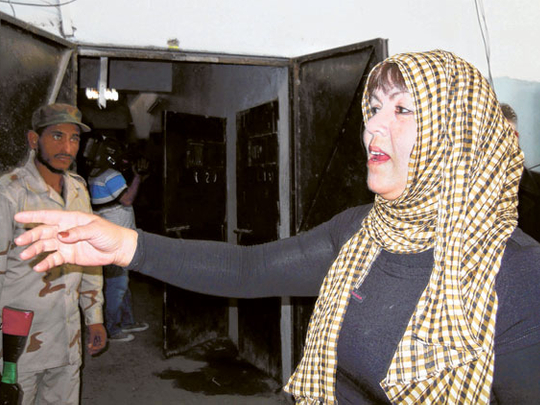
Tripoli:() Muammar Gaddafi's intelligence service killed Nadia Saif's husband for plotting to assassinate the dictator, seized her villa, then held her for seven months in a tiny cell where she says she was raped twice by a guard.
The 59-year-old and others brutalised by Gaddafi's regime now demand that their tormentors be put on trial, but swift justice seems unlikely. Libya has just emerged from a traumatic civil war that piled new grievances onto the old ones of nearly 42 years of Gaddafi rule.
Tens of thousands have been killed, wounded and displaced in eight months of fighting that ended with the tyrant's capture and death in late October.
Many claims will likely have to be settled through mediation and compensation, rather than the courts, to help wounds heal quickly and allow for a new beginning, said Jamal Bennour, a prominent Libyan judge.
"The priority is reconciliation," said Bennour, part of a team that is drafting the rules for a "Reconciliation Commission" that is to hear complaints by victims of the Gaddafi regime and the civil war. Victims can also demand trials, he said, but acknowledged that Libya's justice system will first have to be built from scratch.
Saif, the ex-prisoner, said she fears many of the guilty will not be punished, including those who had minor roles in the regime. "The big guys, without the small guys they can do nothing," she said of those who imprisoned her. "We don't care about money, but we want our dignity back."
Her story provided a glimpse of widespread human rights violations by the regime, which employed brutal tactics to quash dissent. Revolutionary forces have also been accused of abuses against former Gaddafi supporters, raising the prospect of a difficult road ahead for those trying to rebuild the country and unite its 6 million people.
Confident woman
Saif and her husband Mohammad had once been among the beneficiaries of the Gaddafi regime. Her husband worked for the intelligence service and the couple lived with sons Mohammad and Mukhtar in a six-room villa in Tripoli's upscale Andalus neighbourhood. Saif, a confident woman who once worked as an English translator, said her husband eventually resigned, disgusted by his work, and opened a furniture store in Andalus.
In 1996, he and others were arrested on suspicion they had plotted to overthrow Gaddafi, Saif said. Two years later, she was also arrested on suspicion of being an accomplice and taken to the intelligence service's interrogation wing, part of the Abu Salim prison complex, Saif said.
She was thrown into a cell just big enough to put a mattress on the ground. "It was all dark," she said of her first moments in the lockup. "They interrogated me. They started telling me bad words. They started beating me."
Saif said she was raped twice by a guard the others called "The Bull" — once in her cell and once in a secluded outdoor area nearby. After the first attack, she bled heavily and was hospitalised for three weeks, then sent back to prison, where she continued to bleed, she said.
Breaking norms
Saif's willingness to speak about the assault was unusual in conservative Libya. Victims of rape, including those believed to have been assaulted by Gaddafi's forces in the civil war, often fear being stigmatised. International Criminal Court prosecutor Luis Moreno Ocampo says he has evidence indicating hundreds of women were raped during the war and has promised to examine allegations of crimes committed by all sides.
Saif says that after seven months in the hands of the intelligence service, she was sentenced to two years in prison on bogus charges that she wrote a bad cheque. In the meantime, the intelligence service had taken over her villa and turned it into an interrogation centre.












